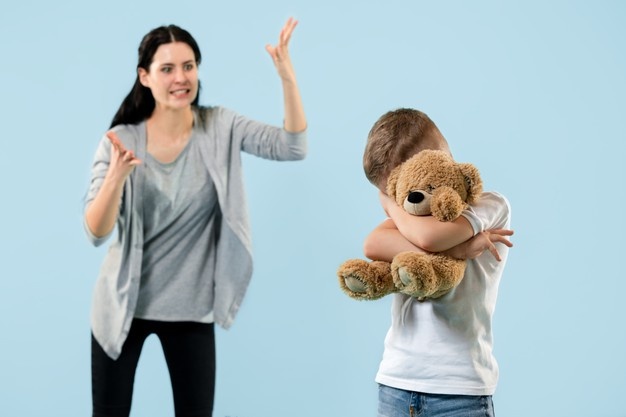- Years ago, when I was working on a study on behavioural problems, an agitated young couple approached me about their five-year-old son, Shambhav, who not only indulged in nail-biting and thumb-sucking but also in bed-wetting during sleep. The mother said, “Every now and then I have to thrash him right and left but the things are rather worsening.”
- Rahil, a three-year-old, would eat such non-edible stuffs as crayons, worn-out paint, dirt or paper. An old lady next door had advised the parents to “lock her in a dark room if she does the silly thing again”. The result was that the child cried and cried, and became blue and limp, sending shock waves all around. The doctor attending on her diagnosed the problem as breath-holding spell. In the months to follow, even minor argumentation would lead to temper tantrums and such spells.
- A five-year-old child, Aarav, was brought by his worried mother for stammering, shyness, night terrors and refusal to eat. She remarked in the child’s very presence that “this congenital idiot will someday drive me mad.” Then, and only then, the son and the father would learn a lesson, added she.
- Eight-year-old Ritu, was said to be getting on the nerves of her parents for her abusive language, lying and stealing. All attempts to thrash her into obedience and decent behaviour had only backfired. What was worse, according to the father, she was beginning to be destructive as well.
- In the case of six-year-old Rehan, the problem was absolute refusal to go to school. While the overindulgent mother narrated the details of the problem, the father appeared to be simply disinterested. Such stories of behavioural difficulties could be duplicated, nay multiplied, by those involved in child care. It is unusual to have a behavioural difficulty in isolation. If there is one behavioural problem, there is more often than not another. In our own experience, around 10 per cent of the children attending the outpatient department of the Government Children’s Hospital in Jammu, suffer from behavioural problems. What is noteworthy is the observation that almost 80 per cent of the sufferers have more than one behavioural difficulty.
Before moving ahead, let me take a pause by quoting Kinsley: “Without a shadow of doubt, I admit that most behavioural problems are annoying to young parents and often drive them crazy – round the bend, so to say. Of course, you cannot afford his odd behavior to go on and on. Yet, it is seldom that the resolution lies in punishment. On the other hand, what you need to give him is more love, more understanding, more attention and more patience. Frankly, I see no other acceptable way out.”
What is a behavioural problem?

You may well ask what a behavioural problem is after all. This, remember, is a child’s way of reacting to a difficult environmental situation – a sort of cry for help. You may regard it as a deviation from normal behaviour to a point at which remedial action is not all that simple and effective.
Behavioural problems at a glance
Habit problems
Thumb-sucking, nail-biting, tics, enuresis (bed-wetting)
Eating problems
Pica, food refusal, vomiting, food fads
Sleeping problems
Night terrors, nightmares, sleep-walking, sleep-talking
Speech problems
Stammering, stuttering
Personality problems
Jealousy, shyness, timidity, fears, bouts of anger
School adjustment problems
Reading, writing or mathematical disability, school phobia, absenteeism, repeated failures, aggressiveness
Sexual problems
Masturbation, homosexuality
Social adjustment problems
Juvenile delinquency in the form of stealing, lying, destructiveness, gang activities
What is its basis?

Why does the child indulge in an odd behaviour? To quote Freud, “Odd behaviour is a reaction to a wide variety of factors operating before pregnancy, during pregnancy, during delivery, in neonatal period, and in subsequent environments from time to time.”
Let me make it clear that by environment is meant what we doctors label as “emotional environment”. This relates to such factors as parental attitudes, siblings, neighbourhood, school and mass media including movies, television, radio and magazines, etc.
The faulty parental attitudes are the single most important cause of behavioural difficulties, especially in a young child. Emotional conflicts resulting from such attitudes may be related to either overprotection or rejection.
Overprotection means more than excessive protection of the child against danger with the result that he is not allowed to take care of himself and grow up like his peers who are given balanced protection. I know of one Mrs. Uma Chopra who considered her little daughter “far too delicate” and the “only link with her late husband” who had been killed in a plane crash. The lady never allowed the daughter to go out on her own lest she caught a cold or mixed with rough children and learnt bad language. Even her homework was more or less done by the overindulgent mother. Overconscious about the child’s health, she was virtually daily recording her body temperature with an “imported” thermometer and getting her stools tested every week. Result – the girl turned out to be overdependent and was late in picking up various skills. Not just that. She turned out to be immature, timid, friendless and vulnerable to bullying at school. Now an adolescent, she is beginning to develop manifestations of aggressive behaviour.
Overprotection may happen in the only child, the only son, a child born after many years of waiting, the first son (more so when this is a joint family), a very good-looking child, a mentally or physically-handicapped child, in case of loss of a spouse or failure on the part of a spouse to play his or her role well, or a child who is supposed to have brought fortune to the parents, etc.
Rejection, on the other hand, usually accompanied by favouritism to the other child, may amount to failure to attend to the normal needs of the child, unfavourable comparisons, sending to an institution when the circumstances do not demand it, unnecessary scolding, excessive punishment, or failure to please the child consistently with a reward as and when appropriate.
Rejection, as you would appreciate, may happen in an unwanted child, an illegitimate child, a stepchild, a mentally or physically handicapped child, a child who is supposed to have brought bad luck to the family, or a child who is chronically mischievous and a constant source of troubles for the parents.
Interestingly enough, quite often the faulty parental attitudes may well be a mixture of overprotection at one time and rejection at another, depending on such diverse factors as parents’ mood, financial position, job satisfaction, interparental relationship, etc. Lack of consistency on the part of the parents confuses the child, leading to conflict, anxiety and insecurity.
You can, therefore, see that the cause of disturbed behaviour in a large majority of the children is insecurity, tension or lack of love. Nevertheless, do not walk off with the impression that I am trying to blame the parents and raising an accusing finger. Far from that! Parents, in fact, have their own personality problems which need attention. What they learn from friends, doctors, books and magazines often gives them conflicting advice. Consequent upon that, they are at their wits’ end as to what to do.
The way out

The question that arises is – What, then is the way out? My earnest suggestion is that you turn to your family doctor for help for the behavioural problems of your child. Of course, you should do that after making a thorough search for the cause at your own level with an unbiased mind. An interested doctor can be of immense help to you and your child. He will make you see the real nature of the difficulty and isolate the factors in the emotional environment that caused intense anxiety. He will also assist you to cope with the situation and, possibly, remove the offending causative factor(s).
No wonder, most qualified child specialists manage many more children with behavioural disturbances than is usually realised. Knowing the family well puts the doctor in an advantageous position to recall the attitudes that may be contributing to the child’s emotional problems.
I must emphasise the usefulness and value of free and frank projection of the child’s as well as your own problems to the doctor. The other day, I heard a young lady who had just been to the family physician, making this silly statement: “I wonder why the hell he was interested in our attitudes and personal problems. All I wanted him to do was to solve the problem of delinquency in our son.”
You can appreciate how such a consultation from the physician proves of little or no worth. Just because the lady had no idea that the child’s problems are not to be seen in isolation! The physician must be given the chance to understand the family and the rest of the child’s environment. How else can he do his job well?
Remember, it is not enough for the physician to know only one parent since both parents influence the child’s behaviour, not only by their direct relationship with him but also by their influence on one another.
And, before I forget, make a note that there are other relationships of importance (including siblings, peers, grandparents, uncles, aunts, cousins, teachers and students in the school) that may also need to be looked into in evaluating the child’s odd behaviour. So, be ready to help the physician on this front as well.
More often than not, the educated folks are given to understand that all behavioural problems need a specialist’s advice. That is just not true. So, don’t be overzealous in rushing for such a consultation.
Undoubtedly, as and when your doctor feels that a consultation from a psychologist or a psychiatrist is indicated, he will certainly advise you to seek it.




